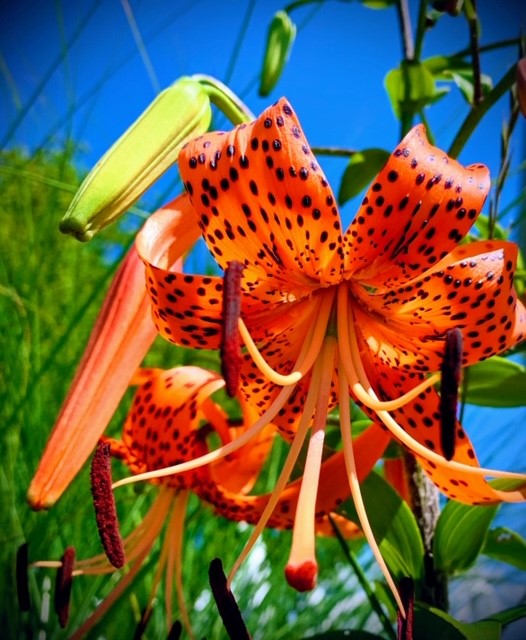Soil and Spirit
By Jean Golicz, Master Gardener and Board of Trustee member
Posted on
Integrated Pest Management: Garden survival during a pandemic or pandemic survival from gardening?
“Integrated Pest Management (IPM) is a sustainable and scientific approach to managing pests. IPM practitioners base decisions on information that is collected systematically as they integrate economic, environmental and social goals. This approach applies to any situation, agricultural or urban, and is flexible enough to accommodate the changing demands of agriculture, commerce and society. The University of Connecticut IPM Program staff members work directly with and provide educational outreach to commercial growers, natural area managers, groundskeepers, educators and the general public in Connecticut.”

But what does that mean to this gardener who just discovered Powdery Mildew, Black Spot, and Hibiscus Sawflies in her garden this morning? Perhaps in simpler nonacademic terms it means, “Right plant, right place.”
For the horticulturist, it involves cultural, physical, and biological controls. By choosing the correct plant that is well suited to certain environmental conditions or cultural applications, the gardener will presumably avoid problems. That’s the reason for reading the labels poking out from the foliage of that potted plant! According to the University of Connecticut, “Planting plants that are adapted to your growing conditions, planting them in the right place, giving proper attention to their water and nutritional needs and the like produces strong plants that resist diseases, outgrow weeds and are less likely to succumb to insects.”
But what if this gardener was tempted to plant a few oriental lilies? Intrigued by their beauty and ignorant of their demands, I incorporated them into my garden. So now I endure the consequences of that impulsive decision. I thoroughly and methodically remove red lily leaf beetles from each plant. Professionals describe this process as physical control. For example, “if the pests are already present, physically removing them by some means. For example, this could mean using barriers, traps, vacuuming, mowing or tillage, depending upon the pest”. In my case, it’s my fingers.
If I didn’t pick the right plant for the right place, and I’ve neglected my gardening duties, there is still hope. I can enlist the help of others. Biological controls “use predators, parasites and diseases of pests in a targeted way to suppress pest populations.” In the case of my oriental lilies, the University of Connecticut has been releasing parasitic wasps that consume lily leaf beetle larvae.
There are lots of pests in our own lives these days. Do these control methods apply? For example, how do I create a nurturing environment that strengthens and sustains healthy relationships? Is it possible to gracefully and compassionately eliminate toxic interactions? When and where do I need to develop supportive relationships that protect and honor my being?
I suppose it would be wonderful if we all chose correctly the right plant for the right place, the best person for the current predicament. But inevitably we don’t and then what? Picking off red lily leaf beetles is excruciating work but it needs to be done and when I’m tired I pray. I pray that a lovely wasp will gently land and protect the beauty that still exists.
So much to consider during this challenging time as we all try to remain physically, emotionally, and spiritually healthy. So for now, I will return to the garden humming the old hymn “It is well with my soul”. Today, I shall enjoy the lilies.
For more information on Integrated Pest Management click here.
